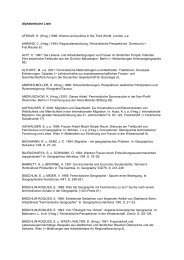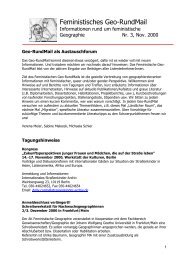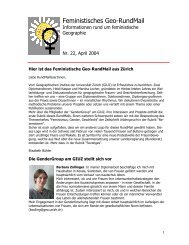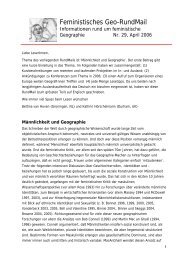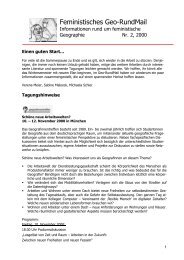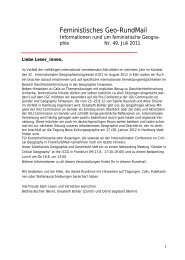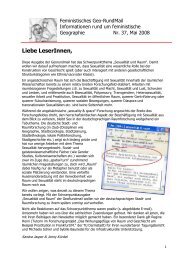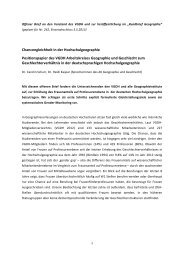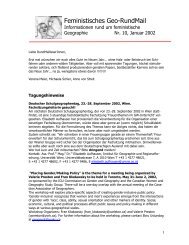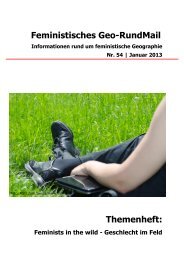Nr. 48, Mai 2011 - AK Geographie und Geschlecht
Nr. 48, Mai 2011 - AK Geographie und Geschlecht
Nr. 48, Mai 2011 - AK Geographie und Geschlecht
Sie wollen auch ein ePaper? Erhöhen Sie die Reichweite Ihrer Titel.
YUMPU macht aus Druck-PDFs automatisch weboptimierte ePaper, die Google liebt.
Nicole Laliberté (Pennsylvania State University, PhD candidate): Gender <strong>Mai</strong>nstreaming: a Challenge<br />
to Feminist Methodologies<br />
In 1995, gender mainstreaming was set forth as a policy directive at the UN Fourth World Conference<br />
on Women in Beijing. Fifteen years on, gender mainstreaming has become a commonplace<br />
tool used to incorporate gender into the policies and programs of many development<br />
agencies. Although vaguely defined, it has made gender a more common focus for development<br />
research and activities. But as with many trends in development, gender mainstreaming has<br />
been shaped by technical solutions and operational procedures. This paper investigates the<br />
ways in which this institutionalized and technocratic approach to gender mainstreaming affects<br />
the possibilities for feminist methodologies. Using a case study of a feminist political geography<br />
research project in northern Uganda where gender mainstreaming programs are prolific, this<br />
paper argues that rather than making feminist research easier, institutionalized gender mainstreaming<br />
creates a unaccomodating environment for alternative feminist methodologies. By establishing<br />
a norm of gendered research subjects (both in terms of individuals and topics) and<br />
the methods appropriate for studying these subjects, technocratic approaches to gender mainstreaming<br />
create a surprisingly homogenious landscape in regards to the politicization of gender<br />
and gender research. People have learned to expect particular kinds of questions and to be<br />
rewarded for particular kinds of answers. In this context, the preferred methods of gender<br />
mainstremaing work - questionnaires and focus groups - tend to perpetuate the same stories<br />
and the same types of subjectivities. In this case study, a deeper ethnographic approach has<br />
proven an effective alternative in eliciting the complexities of the gendered processes producing<br />
the post-war landscape of northern Uganda. This paper argues that feminist methodologies<br />
need to be employed in a flexible manner that can adapt to the particular political landscapes<br />
created by gender mainstreaming.<br />
2. SESSION<br />
Bettina Fredrich (University of Bern, Post-Doc): Challenging »female victims« and »male perpetrators«?<br />
Embodying security discourses in Switzerland<br />
In the 1980s the state centric and masculinist imagination of »national security« was challenged<br />
by Elsthains (1987, 91) statement »No children are ever born, and nobody ever dies, in this<br />
constructed world. There are states, and they are what is«. With the claim »the private is political«<br />
feminists introduced a new perspective of security that gro<strong>und</strong>s (inter)national security discourses<br />
in the »everyday«. Feminist scholars aimed to address gender specific security needs<br />
and pointed to the importance to focus on the scales of the home and the body. In the aftermath<br />
debates about gendered approaches to security were negotiated in academia as well as in<br />
political practice.<br />
By looking at the empirical example of Switzerland my presentation demonstrates how debates<br />
about the gender dimension of security amplified in the political practice. The feminist critique<br />
introduced in the 1980s echoes in the changed practices of foreign policy as well as in public<br />
discussions about »national security« in Switzerland. In this context the question arises, if the<br />
shift in spatially imagining security also changed the way gendered subjectivities are being ne-<br />
17



